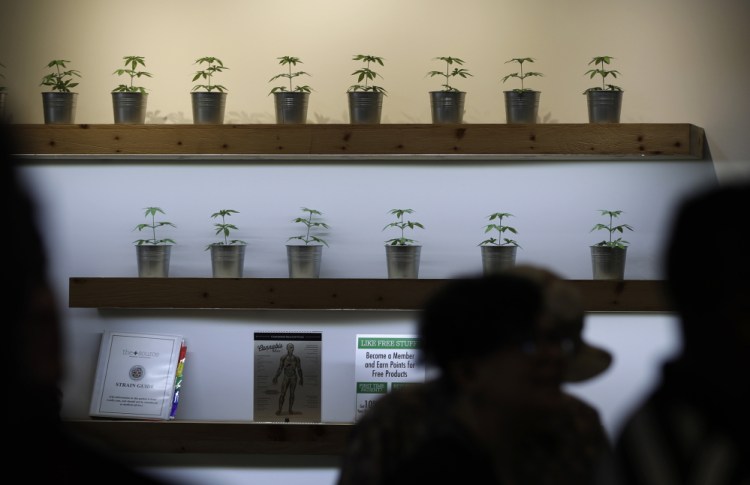Nevada officials have declared a state of emergency over marijuana: There’s not enough of it.
Since recreational pot became legal two weeks ago, retail dispensaries have struggled to keep their shelves stocked and say they will soon run out if nothing is done to fix a broken supply chain.
“We didn’t know the demand would be this intense,” Al Fasano, co-founder of Las Vegas ReLeaf, said Tuesday. “All of a sudden you have like a thousand people at the door. … We have to tell people we’re limited in our products.”
In declaring a state of emergency late last week, the state Department of Taxation warned that “this nascent industry could grind to a halt.”
As bad as that would be for marijuana consumers and the pot shops, the state has another concern: tax revenue. A 10 percent tax on sales of recreational pot – along with a 15 percent tax on growers – is expected to generate tens of millions of dollars a year for schools and the state’s general fund reserves.
With about 100 growers in operation across Nevada, there is plenty of wholesale marijuana. The crisis has to do with distribution and state rules over who is allowed to transport marijuana.
In the run-up to last year’s state referendum over legalization – which was overwhelmingly approved by voters, allowing people age 21 and over to buy or possess up to an ounce of marijuana – the state’s powerful alcohol lobby worried that legalized weed would cut into liquor store sales.
So in a concession to the alcohol industry, the ballot measure stipulated that for the first 18 months of pot sales only wholesale alcohol distributors would be allowed to transport marijuana from cultivation facilities to the dispensaries.
When legalization took effect July 1, nearly 50 dispensaries – all of them already in the medical marijuana business – had been licensed to sell recreational pot. But no alcohol distributors had been approved to transport it.
The state Department of Taxation, which regulates legal marijuana, said it had received about half a dozen applications from alcohol distributors but that none had so far met the state licensing requirements, which include background checks and security protocols.
As a result, the dispensaries have had to rely on marijuana already in stock.
Dispensaries and state officials had anticipated the problem, and in late June the Department of Taxation attempted to loosen the licensing rules to allow dispensaries to transport their own marijuana.
But a District Court judge blocked the request, arguing that the state needed to go through the regulatory process to determine how many distributors were needed. The state appealed the decision to the Nevada Supreme Court.
In the meantime, the Department of Taxation proposed emergency regulations aimed at expanding the pool of potential distributors.
Deonne E. Contine, executive director of the state agency, wrote in the state of emergency declaration that the industry would be unable to function “unless the issue with distributor licensing is resolved quickly.”
Gov. Brian Sandoval, who did not support legalization, has authorized state officials to hold a hearing Thursday to establish emergency reforms, including speeding up the review process for transport licenses and allowing cannabis companies to move pot if they meet certain requirements.
Four other states where recreational pot is legal – Colorado, Oregon, Washington and Alaska – allow the dispensaries to transport marijuana themselves, with no privileges given to alcohol distributors.
“It is important that the distribution issue gets resolved, because if it is not sales will be halted completely,” said Riana Durrett, executive director of the Nevada Dispensary Association, a nonprofit that advocates on behalf of retail pot shops.
Many Nevada dispensaries had stockpiled marijuana before legalization took effect.
“We bought as much as we could hold ahead of legal sales beginning,” said Fasano, whose dispensary is less than a block from the Las Vegas Strip and sells mainly to tourists.
The state dispensary association said that in the first four days of legalization customers bought $3 million to $5 million worth of pot. The state is not scheduled to release its numbers until the fall.
Tanya Lupien, vice president of sales and marketing at Medizin Las Vegas, said Tuesday that her dispensary was running low on “grab and go” items such as marijuana edibles and vape pens, and that without a resupply the business stands to lose tens of thousands of dollars a week.
“We need expanded regulations to have business as usual,” she said.
Send questions/comments to the editors.



Success. Please wait for the page to reload. If the page does not reload within 5 seconds, please refresh the page.
Enter your email and password to access comments.
Hi, to comment on stories you must . This profile is in addition to your subscription and website login.
Already have a commenting profile? .
Invalid username/password.
Please check your email to confirm and complete your registration.
Only subscribers are eligible to post comments. Please subscribe or login first for digital access. Here’s why.
Use the form below to reset your password. When you've submitted your account email, we will send an email with a reset code.